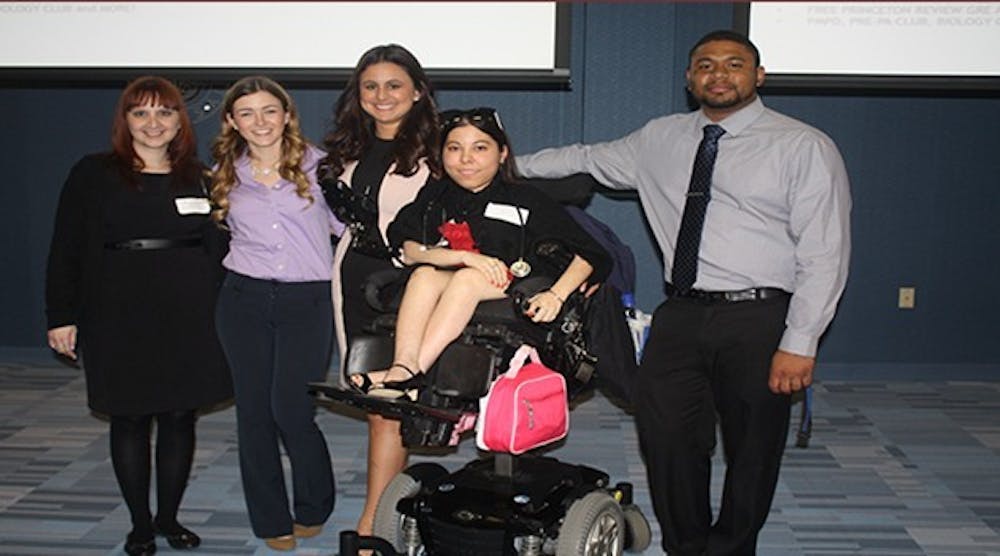The Biology Club Executive Board
From left to right: Kerrylynn Konecny (advisor), Jessica Granberg (treasurer), Karen Grisales (vice president), Matildelis Medina (secretarty), and Theodore Thompson (president). Not pictured Jennifer Varghese (public relations)
When people think of what a biology major student can do after they graduate, they usually think of a biology student becoming a doctor or a scientist. But those two professions are not the only professions available to a biology major, or any other science major.
As proven by the recent Biological and Health Sciences Career Conference, any student majoring in science can go into one or more of the numerous amount of fields that science has to offer. As said by the president of the Biology Club, Theodore Thompson, who is a senior majoring in environmental science, “this conference is to equip students with more information about [the field of science] so they can leave with more confidence about what they want to do after they graduate.”
The conference was hosted by the Biology Club on Saturday, April 25, 2015, in different areas of the University Center (UC). The conference consisted of six hours of useful information on how a student can succeed in the science field. A total of 21 speakers came together to inspire future doctors, dentist, physician assistants and more. The speakers included Wahab Zafar, who works at Richmond University Medical Center (RUMC). “My first day as a resident I had a patient with very high blood pressure,” says Zafar to a crowd of attendees, “the blood pressure was at 200 over 100. I was able to lower the blood pressure…to 120 over 80, which is normal. The patient then began complaining about not being able to feel [their] arm…turns out the patient had a stroke.” This recount of Zafar’s allowed attendees to realize how a career in science affects lives in one way or another.

“I really enjoy listening to what the speakers have to say,” comments Emily Clauss, a junior majoring in pre-physical therapy, “My favorite lecture was of medical malpractice with [with defense lawyer Jennifer Walsh] and the informational session on Graduate Record Emanation [GRE].” Not only were students able to learn about a day in the shoes of a medical resident and information on tests like the GRE and Medical College Admission Test (MCAT), but they also had a chance to learn the do’s and don’ts of majoring in pre-dental or pre-medical.
Kean University student Willian Jumbo, who is a senior majoring in biology, informs students about the do’s and don’ts of the pre-dental field. “The one thing you should do is plan and save early,” Jumbo says, “it is pretty expensive to apply to dental school.” It cost about $440 to take the Dental Admissions Test (DAT), another $200 to send the scores to the dental schools a student wishes to apply to, the application fee for every school a student applies to. “It can cost between $1,000 and $2,000, depending on how many colleges you apply to,” Jumbo tells the audience, “and since the DAT is very expensive, prepare yourself for it so you won’t fail.”
Jumbo continues to say that students who are preparing themselves should aim to get a score of twenty or higher while taking the DAT practice exams so they can feel confident while taking the actually exam. Many dental schools are looking for students who achieve a score between 19 and 23 with scores between 17 and 18 being average score, 19 and 20 being a usually good score and 22 to 23 being a very high score. “So the best thing you can do is to test yourself, [and hopefully] you can get a score in the twenties,” continues Jumbo.
Another speaker was dentist Maria Grisales, who is the mother of Biology Club Vice President Karen Grisales. “I don’t only clean teeth,” Maria says as she speaks to the crowd with a strong and passionate voice, “I make sure my patient has a healthy mouth, a healthy smile, and good breath.” She continues to say that it is important for people to have a healthy mouth and that “we don’t realize how much we use the mouth. We have to have someone tell us.” Maria then says “I work 3 and a half days a week and make six figures.” With this dedication and passion, Maria gave hope to many of the students, including her daughter, Karen, who is a senior majoring in biology, in hopes in one day of becoming a gynecologist. “My mom is definitely my source of motivation to fulfill my dream,” comments Karen, “and the reason why she is so well paid is because you can feel her passion for her profession.” In fact people did as they learned that Maria moved from Columbia to the United States when she was 17 and did not know a single word of English. She eventually learned English and put herself through years of schooling to become a dental hygienist.
All in all the conference was a hit as many students like Khadijia Martin, a sophomore who is majoring in biology, who comments that “there was a good variety of professors for students to learn from, and it was definitely a great event for biology majors.”
This is the first Biological and Health Sciences Career Conference, but there will be another one next year. So for those who did not attend this year’s conference, don’t worry, there is another one coming. The conference was created “to raise awareness in the health and sciences field,” comments Thompson, “and we [the executive board of the club] wanted to make sure that students who are interested in a science field are confident in themselves after they graduate college.”
For more information about the Biology Club, please visit the organization’s page on Cougar Link.

Members of the Biology club
From left to right: Matildelis Medina, Jessica Granberg, and Karen Grisales




